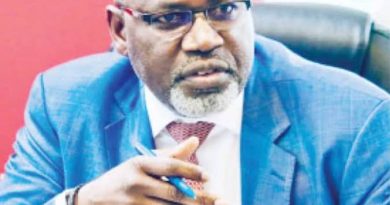Police Recruitment: Dangers Of The Looming Professional Gallops In Policing System In Nigeria…. By Olalekan Johnson
One would often wonder how a house divided against itself can stand. This adage rings particularly true for the current state of police recruitment and professional standards in Nigeria. The Nigeria Police Force (NPF) has long been a crucial institution tasked with maintaining law and order.
However, recent developments in recruitment processes and professional standards have raised significant concerns about the future effectiveness and integrity of the policing system.
The relationship between the Nigeria Police Force (NPF) and the Police Service Commission (PSC) exemplifies this divide. The collaboration between these two government institutions has been fraught with issues and crises, hindering the smooth operation and administration of the Police. This dysfunction has resulted in significant disruptions, particularly in ensuring the security of citizens and their property.
Recently, the two institutions clashed over the recruitment of Constables into the Police Force, raising numerous issues that require urgent attention to preserve the integrity of the policing system in our country.
As one with great interest in the security sector, particularly the reforms of the current administration, I have watched with awe the various procedures involved in the making of the Nigeria Police Officers. The dynamics between the PSC and the NPF, especially regarding recruitment, have been a focal point of my attention, considering the critical need for a cohesive and transparent process.
Upon announcement of the commencement of the recruitment process for Police Constables by the Police Service Commission which was re-echoed by the Nigeria Police Force via press statements, the hunger games of joining the institution began with young men and women, some who fit the profile required for recruitment, and some who do not, but hope to exploit the “inherent loopholes” in the system for their benefit. From the Physical Screening to the Computer-Based Test (CBT) to the Medical Screening which held variously at Police State and Zonal Commands, I watched with keen interest. Then finally, after a rigorous process, the final list was announced.
What initially felt like a relief soon got disrupted with many complaints by applicants on social media platforms. I took this in its stride acknowledging that individuals would almost always criticize a process on the basis that it did not serve their purposes. This was my position until my attention was drawn to some irregularities.
Chief amongst these irregularities was the fact that applicants were being referred to a different website to view their standing on the list. This was very much suspicious considering the fact that the portal used for registration and all the previous screenings was still up and running. Why did the PSC then choose to use a different website and what is the assurance that all the data on the former were safely transferred to the new website to ensure the possibility of tracing an applicant’s success story from registration to being recruited?
Also, another troubling issue was the fact that unlike the pattern used by the Police in the past, which is the same for virtually all uniformed security services in the country, where the full list of successful candidates is available to the public for scrutiny, the list was restricted and was not available for public viewing. An applicant may only find out if he/she was successful by entering one’s National Identification Number on the new portal. There is virtually no way to tell if the list complies with the constitutional federal character principle, the number of successful applicants per state, or if these individuals could be recognized by others who participated in the screening process as bonafide applicants.
While still pondering on these irregularities, hoping there was a good explanation for the secrecy, the Nigeria Police shattered the trail of my thoughts with a press statement signed by its Force Public Relations Officer, ACP Olumuyiwa Adejobi for the Inspector General of Police on June 15, 2024, raising alarm on irregularities and corruption in the process. The statement mentioned that the list released on the Police Service Commission portal was full of several names of successful candidates who did not even apply and therefore did not take part in the recruitment exercise, while some failed either the CBT, the physical, or the medical screening. The Police also noted that most worrisome is the allegation of financial dealings and corrupt practices leading to the outcome where unqualified and untrainable individuals have been shortlisted, leaving the Police to bear the brunt of the recruitment of unqualified individuals.
I have consistently monitored the administration of the police including my keen interest in the affairs of the regulatory body to superintend over the activities of the Nigeria Police Force most especially in the areas of recruitment, promotion, discipline, and other oversight functions as stipulated by the Constitution and the act establishing the Police Service Commission. I have painstakingly examined the recruitment process and the outcry of the police authority concerning some irregularities spotted in the process which were made public by the Police force headquarters.It is pertinent to note that the police have raised germane and worrisome issues that marred the recruitment process and the need to review the process for the sake of the applicants and the general interest of the populace. In another fora, the IGP has re-echoed that the Police Force will not dignify and concur with ineffective, epileptic and faulty recruitment process as such is synonymous with a state of anarchy in our country, a position he is very much entitled to since the Police is in charge of training these individuals that have been recruited and will eventually be the end user.
I very much expected the Police Service Commission to respond, but not in the defensive manner that they did as though they had something to hide. It would have been more proper to urge the Police to synergize as the foremost investigative outfit in the country, to assist in identifying the source of these claims, verifying its authenticity, and ensuring individuals fingered in the allegations were appropriately sanctioned while promising to erase all questionable individuals from the list and replace them with qualified applicants.
Rather, the PSC has in the past few days resorted to becoming Wilson Tagbo of the one week, one trouble fame, coming up with one statement after another focusing on the grave sin of ad hominem against the office and person of the Inspector-General of Police rather than table logical arguments and explanations. Almost every individual at the Commission have all but signed off a press statement targeting the IGP.
THE ISSUES
Functions of the PSC
The Police Service Commission derives its functions from the combined effect of Part I of the Third Schedule to the 1999 Constitution of the Federal Republic of Nigeria (as amended) and Section 6 of the Police Service Commission (Establishment) Act 2001. These provisions, which have been sealed by a Supreme Court Judgment is clear as to the fact that the PSC is responsible for appointment, promotion, and exercise disciplinary control over members of the Force, except the IGP. This function has not been in contention as being peddled in the various statements emanating from the joint staff union of the PSC, and others.
The IGP or the Police authority has not called for the usurpation of the function of the PSC. The Police has rather called for the function to be exercised transparently without breeding illegality. It is vital to observe that asking the IGP and other well-meaning members of the public not to concern themselves with how the function of the PSC to appoint is exercised would imply that the PSC is unquestionable and not subject to review. It would mean that the PSC is infallible and final in all matters of appointment irrespective of the calibre of persons they chose to appoint into the Force.
Rather, it is instructive to note that it is the PSC that has usurped their powers by calling for the removal of the IGP for mere questioning their process when the same Act they rely upon clearly state they have no such powers. They could have criticized the IGP and it would not hit a nerve, but calling for his sack is a clear pointer to the fact that most of them do not even understand the Act regulating their actions. Or are they working for someone? Or are they paid agents? These questions must be answered by the PSC unions.
Affirmation of CBT, Other Tests
Also, the Nigeria Police Force in its series of engagements never questioned the process of the Computer-Based Test and others alike but the final list of successful candidates itself. The PSC going on to claim that the Nigeria Police Force was a part of the process does not extricate them from the allegation. Of course, the police admits that there was a recruitment board set up with representatives from the NPF, that the Joint Admission and Matriculation Board (JAMB) handled the computer-based test (CBT), and that the physical and medical screenings followed due process. After all the transparency, why did the PSC go on to release a list that clearly defeats the strenuous process the board has been subjected to up to this point?
Release of List on Different Website/Portal
Another issue in point which the PSC has clearly avoided is the fact that a new website hitherto unknown – https://www.policeservicecommission.cloud/, was put out for applicants to verify if they were successful or not rather than the original website used for the registration and screening – https://apply.policerecruitment.gov.ng/. While it is vital to add that the PSC has so far not responded to any of the issues raised but have gone on to raise counter-accusations and point fingers here and there, this point is a very valid one which requires urgent elucidation. Why was the list of successful candidates inexplicably made available on a different website. This discrepancy illustrates a severe lack of coordination, truthfulness and transparency. Applicants who monitored the designated portal for updates were left in the dark, while a separate portal displayed the final list of successful candidates. Such procedural anomalies not only confuse applicants but also raise concerns about the integrity of the recruitment process.
Padding of Final List
In the position of the police, and as a follow-up to my findings from undisclosed sources, the final list released by the Commission was padded with names of unqualified candidates, who didn’t even apply for the job in the first instance. Also, those who wrote the CBT, and couldn’t make it to the final screening stage, had their names published by the Commission via a different portal created by the Commission aside from the already existing portal designated for the recruitment exercise. This is questionable.
In addition, and in line with the observation of the police, it has been revealed that more than two thousand (2000) names of unqualified candidates were released. In fact, some who were diagnosed with some critical ailments, who were screened out, were successful in the final list. This has been of great concern to the police authority, and by extension, to the general public who will also feel the heat of ill recruitment process.
Allegation of Extortion/Corruption
This particular issue has almost become a norm in all similar processes in the country. Job racketeering has become the cash cow of individuals in public offices. It is almost impossible to find individuals who get public jobs on merit without some form of pecuniary loss. As saddening as this is, it is laughable for the PSC to claim to be saints. Can anyone claim to be more Roman Catholic than the Pope?
This would have probably been a none-issue if individuals got appointed on merit, then others may flow in through the benefit attached to the federal character principle. However, where individuals who have clearly passed the process are not recruited while individuals who cannot even write basic English, as seen on a social media post where one of such was raining curses on the IGP for not “allowing him to proceed for training”, are recruited, it behoves on all right-thinking individuals to call for a review of the process.
The police have raised the issue of extortion and corruption in the process, which have been corroborated with some individuals currently under investigation and with many revelations that are shocking. I was also made aware of an individual who allegedly paid a whopping sum of Seven Hundred Thousand Naira (N700,000) to a staff at the PSC to get a candidate’s name on the final list.
Proof of Allegations compiled and sent to PSC
While doing a follow- up on this matter before publication, I was reliably informed that the Police Authority has done its part by investigating and collating some proof of the allegations in its statement on the final list of the police constable recruitment and have sent same to the Police Service Commission so they would be aware that the Police’s position is laudable and not based on sentiments. While I applaud the Inspector-General of Police, IGP Olukayode Egbetokun, for this brave move, I do sincerely hope that the PSC would look into these proofs, and strive to ensure transparency in its process to engender public trust in the process. For according to Beth Moore, “differences will always exist, but division doesn’t always have to result.”
Call for Forensic Audit/Review of Final List Process
I am aware that the NPF has been consistent and adamant in its quest for an extensive forensic audit and a detailed review of the entire 2022/23 intakes recruitment process. I totally back this call and urge all well-meaning Nigerians to support this attempt to cleanse the recruitment process and give deserving individuals a chance to join the NPF and make their contributions to its development. This thorough evaluation is deemed essential to ensure that the selection procedures are transparent, fair, and effective with the objective to identify and address any discrepancies or irregularities that may have occurred during the compilation of the final list.
By undertaking this comprehensive audit and review, it will guarantee that only individuals who meet the highest standards of qualification, trainability, and productivity are admitted into the Force as it is crucial to ensure that the candidates selected are not only capable and competent but also align with the values and operational requirements of the police force.
The commitment of the current police leadership to uphold the integrity of the recruitment process, foster public trust, and ensure that the Force is composed of individuals who are well-equipped to serve and protect the country will definitely pave the way for a more robust and proficient police force.
Award Punishment for Culprits
It is imperative that all individuals found guilty of extortion, corruption, and the manipulation of the final recruitment list be held accountable and subjected to appropriate disciplinary actions. Addressing these issues decisively is crucial for maintaining the integrity of the recruitment process.
Furthermore, enforcing strict penalties for such misconduct serves as a deterrent against future malpractices and reinforces the commitment of the PSC and other Ministries, Departments and Agencies (MDAs) of the government to upholding ethical standards during recruitment processes.
Conclusion
In conclusion, the current controversies surrounding the police recruitment process in Nigeria highlights critical flaws that threaten the integrity and effectiveness of the country’s policing system. The discrepancies, irregularities, and allegations of corruption have undermined public trust and raised significant concerns about fairness and transparency.
We must not view the call for a thorough forensic audit and review as a personal attack, but as a necessary step towards ensuring a transparent and merit-based recruitment process. By addressing these issues decisively and collaboratively, we can cleanse the system of malpractices, uphold ethical standards, and ultimately build a police force that is capable, competent, and trusted by all Nigerians.
It is time for the NPF and the PSC to unite efforts to achieve a more effective and efficient recruitment process that serves the best interests inof our country.
May Nigeria Succeed.
Olalekan Johnson is a Public Policy Analyst and Executive Director, Transparency and Accountability Network in Nigeria (TANN)




